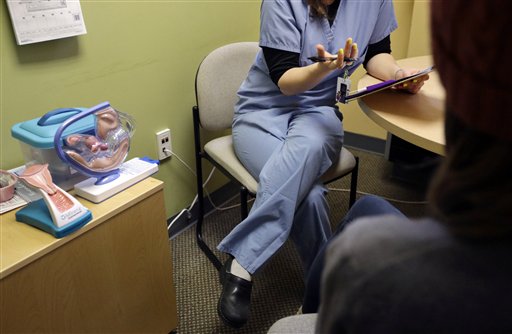(AP) Protests at abortion clinics back at high court
By MARK SHERMAN
Associated Press
WASHINGTON
The regulation of protests outside abortion clinics returns to the Supreme Court for the first time since 2000 to find the justices seemingly more protective of speech and less committed to abortion rights.
That combination could prove difficult to overcome for the state of Massachusetts as it seeks, in arguments at the high court Wednesday, to defend a law that prohibits abortion protests any closer than 35 feet from the entrance to clinics. Painted semicircles outside Planned Parenthood clinics in Boston, Springfield and Worcester mark the spot beyond which abortion opponents are free to protest and try to persuade women not to end their pregnancies. Inside the line, protesters and supporters alike risk arrest.
Seventy-seven-year-old Eleanor McCullen and other protesters at those clinics sued the state over its 2007 law setting up the buffer zone, saying it limits their ability to encounter patients arriving for care. Federal courts in Massachusetts have upheld the law as a reasonable imposition on protesters’ rights.
State officials and clinic employees say patients and staff feel safer and find it easier to enter the clinics. Abortion rights groups report that incidents of violence are down in states and cities that have buffer zones. The last serious violence in Massachusetts was in 1994, when a gunman killed two employees at two clinics in the Boston area.
In 2000, the Supreme Court voted 6-3 to uphold a different buffer zone in Colorado in a decision that some free-speech advocates, who also support abortion rights, have criticized.
Since then, four of the six justices in the majority have retired, while the three dissenters remain on the court. Two of the four newer justices are Chief Justice John Roberts and Justice Samuel Alito, who both have voted to restrict abortion rights. Roberts also has written strong opinions in favor of protesters’ rights, including members of a Kansas church who protest outside military funerals. Alito has been more willing to limit those rights.
Massachusetts Attorney General Martha Coakley said the current case should come out the same way as the Colorado case did 14 years earlier. The only thing that has changed, Coakley said, is the makeup of the court.
Massachusetts had a “floating buffer zone” law modeled on the Colorado law that was designed to keep protesters and patients apart. But Coakley said it was confusing and hard to enforce, prompting the state to adopt a fixed, 35-foot zone.
Notre Dame law professor Richard Garnett, who filed a brief in the case on the protesters’ side, said the Massachusetts law is even more restrictive than the Colorado law. Garnett said the court should have struck down the Colorado law, despite “the temptation to silence unwelcome expression.”
Garnett said free speech, not the right to an abortion, is at issue in the new case. The AFL-CIO, concerned about limits on picketing, also is calling for the law to be struck down.
___
Follow Mark Sherman on Twitter (at)shermancourt.

COMMENTS
Please let us know if you're having issues with commenting.